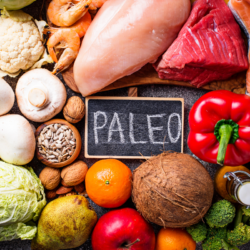The Whole30 programme is a strict 30-day elimination diet. Many people use this type of diet to lose weight or to solve recurring digestive problems. This eating plan invites you to eliminate sugar, alcohol, cereals, dairy products, legumes and additives for a month. It should be noted that the Whole 30 is presented as a new way of life rather than a simple weight-loss diet, as is often the case in the women’s press in the run-up to the summer season. Although many people swear by the Whole 30 to regain their energy and iron health, is this diet really effective?
What are the rules of the Whole 30?
The Whole 30 is a thirty-day eating plan that focuses on eating whole, unprocessed foods. Created in 2009 by Melissa and Dallas Hartwig, the diet has rapidly gained popularity thanks to its promise of physical and mental transformation. The Whole 30 approach is based on the complete elimination of certain food groups likely to cause health problems, such as inflammation, hormonal imbalances or digestive disorders.
The programme encourages the consumption of natural, unprocessed foods such as vegetables, fruit, lean meats, seafood, eggs and nuts. On the other hand, it excludes cereals, pulses, dairy products, added sugars and food additives. The idea is to reset the metabolism, improve the relationship with food and discover the foods that are best suited to each individual.
Basic principles
The basic principles of Whole 30 are relatively simple, but strict. For 30 days, participants must avoid all consumption of forbidden foods. These include:
- Cereals, including wheat, barley, and rye.
- Legumes, such as beans, peas, lentils and peanuts (including peanut butter).
- Dairy products, with the exception of clarified butter or ghee.
- Added sugars and artificial sweeteners.
- Food additives such as MSG, sulphites and carrageenans.
The emphasis is on conscious eating and awareness of the impact of food on the body and mind. The Whole 30 also emphasises the importance of cooking yourself, using fresh, natural ingredients. This approach aims not only to change eating habits in the short term, but also to establish healthier choices in the long term.
What are the benefits of Whole 30?
The Whole 30 diet can offer many health benefits, in addition to helping you lose weight. Here are some of the potential benefits:
1. Reduced inflammation
The Whole 30 focuses on whole, unprocessed foods, which means you avoid processed foods that are often high in sugar, trans fats and food additives. By avoiding these foods, you can reduce inflammation in your body, which can have beneficial effects on your health.
2. Improved digestion
The Whole 30 diet also focuses on fibre-rich foods, such as vegetables, fruit and nuts. These foods can help regulate digestion and maintain a healthy digestive system.
3. Reduced sugar cravings
Whole 30 completely eliminates added sugar from your diet, which can help reduce sugar cravings. This can help you reduce calorie consumption and promote weight loss.
4. Improved energy and mental clarity
By eliminating processed foods and focusing on whole foods, you can provide your body with the essential nutrients it needs to function properly. This can help you feel more energetic and focused.
5. Reduced symptoms of health problems
By eliminating processed foods and focusing on whole foods, you can reduce the symptoms of certain health problems, such as food allergies, chronic fatigue and digestive disorders.
In summary, the Whole 30 diet can offer many health benefits in addition to promoting weight loss. However, it’s important to note that the benefits may vary from person to person, and it’s important to consult a healthcare professional before starting any diet.
What foods are permitted?
The Whole 30 emphasises a nutrient-rich and natural diet. The permitted foods are :
- Meat and poultry: All meats and poultry are permitted, provided they are free from additives and prepared without sugar. It is preferable to choose free-range or organic meat.
- Fish and se afood: All fish and seafood are accepted, ideally wild or sustainably caught.
- Eggs: Eggs of all kinds are allowed, preferably organic or free-range.
- Vegetables: All vegetables, including potatoes, are permitted. However, canned vegetables containing unauthorised additives should be avoided.
- Fruit: Fruit is permitted, but should be eaten in moderation due to its natural sugar content.
- Nuts and seeds: Most nuts and seeds are permitted, with the exception of groundnuts (which are legumes).
- Oils and fats: Natural oils such as olive oil, coconut oil and ghee are recommended.
- Coffee: Coffee is permitted, but no sugar, milk, cream or unapproved dairy substitutes.
What foods should I exclude from the Whole 30?
During the Whole 30 programme, the following foods must be completely avoided:
- Added sugars and artificial sweeteners: This includes sugar, maple syrup, honey, aspartame, etc.
- Cereals: All grains, including wheat, rye, barley, maize, rice, millet, sorghum, oats, and even pseudo-cereals such as quinoa.
- Pulses: Beans, lentils, peas, peanuts and all derived products such as tofu, tempeh and soya proteins.
- Dairy products: All dairy products, with the exception of clarified butter and ghee.
- Food additives: Additives such as MSG, sulphites and carrageenans should be avoided.
- Alcohol: Alcohol in any form is forbidden, even for cooking.
- Sweets or snacks: Although ingredients are permitted, products that simulate sweets, pastries or snacks (such as Whole 30 pancakes) are banned.
By following these guidelines, Whole 30 aims to eliminate potentially problematic foods, while encouraging the consumption of healthy, whole foods for better overall health.
Should I embark on this type of eating programme?
If you want to lose weight, you should opt for the calorie deficit. Given that it’s fairly restrictive, the Whole30 programme will probably go in that direction.
However, unless the dietary choices involved become permanent, your weight loss is likely to be short-lived.
However, the positive side of this programme is that it allows you to detect any intolerances during the reintroduction phase. Very often, caught up in the whirlwind of everyday life, we no longer even pay attention to the signals of discomfort that our body sends us: Le whole 30 helps you to reconnect with your body.
In fact, this diet may be of interest to you if you’re looking for a ‘fresh start’, if you’re eating too many packet foods, fast food and all kinds of delicacies. The Whole 30 will help you get back on the natural track. However, as with all fashionable eating plans, it’s essential to listen to your body and eat a varied and colourful diet, one that gives you energy and pleasure.
What are the disadvantages of Whole 30?
Although the Whole 30 diet can offer many health benefits, it also has a number of disadvantages that should be taken into account before you start.
1. Restrictive
The Whole 30 is a very restrictive diet, as it completely eliminates many common foods, such as cereals, pulses, sugar, dairy products and alcohol. For some people, this can make the diet difficult to follow in the long term.
2. Time and effort required
The Whole 30 requires a lot of time and effort to plan and prepare meals. As many common foods are eliminated from the diet, you may need to spend more time cooking and shopping.
3. Risk of nutritional deficiencies
The Whole 30 eliminates many food groups, which can increase the risk of nutritional deficiencies. For example, the elimination of dairy products can make it more difficult to obtain sufficient calcium and vitamin D.
4. Not suitable for all lifestyles
The Whole 30 may not be suitable for all lifestyles, particularly for vegetarians and vegans. Because the diet eliminates pulses, an important source of protein for vegetarians and vegans, it can be difficult to follow the diet and still get enough nutrients.
5. Yo-yo effect
Due to its restrictive nature, the Whole 30 diet can lead to a yo-yo effect once you’ve completed the programme. If you go back to your old eating habits, you risk regaining the weight you lost.
To sum up, the Whole 30 can have certain disadvantages, such as its restrictive nature, the time and effort required to plan meals, the risk of nutritional deficiencies, its unsuitability for certain lifestyles and the potential yo-yo effect. It is important to weigh these disadvantages against the potential benefits before starting the diet.
Whole 30: What the science says
Many of the principles of this diet coincide with generally accepted nutritional recommendations in the scientific community.
- Unprocessed diet: Numerous studies support the benefits of a diet rich in unprocessed foods, particularly in terms of reducing inflammation, improving heart health and weight management.
- Exclusion of food groups: Strict exclusion of certain food groups, such as cereals and dairy products, may not be necessary for everyone and could lead to nutritional deficiencies if not well planned. However, for people with specific allergies or intolerances, these exclusions can be beneficial.
- Impact on weight loss: Short-term diets such as the Whole 30 can lead to initial weight loss, mainly due to a reduction in calorie intake and changes in the composition of the foods eaten. However, research into the long-term sustainability of this weight loss is limited.
- Digestive and inflammatory health: Reducing processed foods and added sugars can have a positive impact on digestive health and reduce certain inflammatory markers. However, the effects can vary considerably from one person to another.
- Balanced nutrition: Any dietary approach, including Whole 30, must ensure that it provides balanced nutrition. Eliminating whole food groups may require careful planning to ensure adequate intake of vitamins, minerals and other essential nutrients.
In conclusion, although specific principles of the Whole 30 diet are supported by scientific research, notably the emphasis on whole, unprocessed foods, other aspects, such as the strict exclusion of certain food groups, require more nuanced consideration. As with any diet, it is advisable to consult a health professional or nutritionist to ensure that it meets individual nutritional needs and supports a healthy lifestyle over the long term.
Source:
- https://pubmed.ncbi.nlm.nih.gov/25739376/
- https://www.ncbi.nlm.nih.gov/pmc/articles/PMC5579615/
- https://pubmed.ncbi.nlm.nih.gov/31105044/





